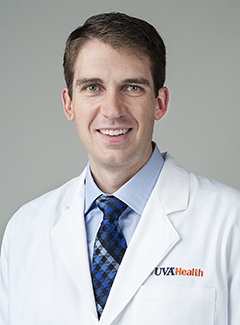
At a Glance
Title: Associate Professor
Fellowship: Johns Hopkins Hospital
Residency: Medical University of South Carolina
Sam Oyer, MD, FACS, is a facial plastic and reconstructive surgeon who specializes in facial paralysis treatment and facial reanimation as well as facial reconstruction after skin cancer removal or trauma. He also specializes in cosmetic procedures, such as rhinoplasty and blepharoplasty, along with neck and face lifts. He arrived at UVA in October 2020, after five years at the Medical University of South Carolina.
What are some of the causes of facial paralysis?
The biggest cause is Bell’s palsy, which primarily affects adults. Other causes are trauma, tumors or cancers within the parotid gland, skull base tumors or infections. Stroke is another cause, but patients usually recover pretty well. Children can also be born with an inability to move one or both sides of their face.
Is it more challenging or stressful operating on such a prominent part of a person’s body?
The face is definitely high-priced real estate so to speak. Every little imperfection shows through, so I take it very seriously. You can’t really hide any mistakes, so everything has to be as perfect as possible. We can’t always achieve complete perfection, but the goal is to achieve a natural look. Nobody wants to look like they’ve had surgery, so we try to hide scars and make them less visible by putting them in places where the eyes naturally see lines anyway, so you don’t see obvious scars there. The goal is to get people back to normal life, so they don’t have anything that is distracting or obvious on the face.
What do you find most rewarding about this work?
Facial reanimation procedures are extremely rewarding for me. When someone comes in unable to move one side of their face or smile, giving them the ability to express their emotions and go back to their personal life and interact with others in a more meaningful way, I think that’s a huge thing for me to be a part of.
Will you also be involved in research at UVA?
Yes, I have several studies going on in a variety of areas including facial paralysis outcomes, how we’re doing and how we can improve those outcomes. I’m also working on a study for nasal and facial reconstruction after Mohs skin cancer surgery, looking at patient-reported outcomes or how patients perceive themselves after this surgery. I have other research going on in rhinoplasty and facial trauma, so there are a lot of research projects in progress.
What were your first impressions of UVA?
I was really impressed with the camaraderie here. Medicine is not a one-man sport. It’s really team-dependent. Some places can have a bit of negativity and competition that creeps in. Within my department and other departments I’ve worked with and other surgeons, it’s been an amazing teamwork situation. People are so cooperative, looking out for the best interest of the patient, willing to help out and lend a hand. I’m very impressed by that.
How would you describe your approach to patient care?
I think my philosophy is to try to figure out for each patient, what that patient wants and how I can help them. Sometimes we think we know what the patient wants, but unless we ask them, we’re missing the point potentially. Some people want the most elaborate treatment possible. Others want a more straightforward, simple procedure that gets them back to life with the shortest downtime. I try to spend time, to get to know what’s important to the patient. I want everyone to have great outcomes.
I’m always happy to see patients and work through any concerns they may have. I also have telemedicine visits available. I know distance and travel can be challenging, especially now with the pandemic, so this makes it easier for patients to receive care. I’m happy to take phone calls or emails from referring providers. I make a point to send notes back to them, so they know the plan.
To refer a patient to UVA Health, call UVA Physician Direct at 800. 552.3723.